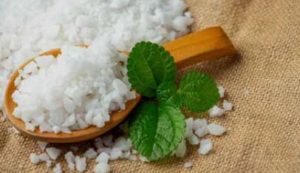
Salt is a staple ingredient used in cooking worldwide. It enhances flavour, preserves food, and also helps facilitate different bodily functions.
The sodium in the salt plays a significant role in maintaining fluid levels in the body, which in turn keeps our heart, liver, and kidneys in sync.
An excessive amount of salt however can be harmful to our body, especially if you have a pre-existing heart condition. In an interaction with the OnlyMyHealth team, two leading experts in the field of cardiovascular health and nutrition, provide insights.
Benefits Of Salt
Here are some benefits of consuming salt:
- Enhances the natural flavours of food, making it more enjoyable to eat
- Acts as a natural preservative, inhibiting the growth of bacteria and extending the shelf life of certain foods
- Contains essential electrolytes like sodium and chloride, which help maintain the body’s fluid balance
- Helps retain water in the body, preventing dehydration
- Aids in the absorption of certain nutrients, such as calcium, in the digestive system
Why Cutting Down On Salt Is Important For Heart Patients
Dr Rajat Kar, Consultant-Cardiologist, Narayana Superspeciality Hospital, Howrah,says, “Decreasing salt intake holds paramount importance for individuals with heart conditions or high blood pressure.”
According to the doctor, excess salt consumption can lead to fluid retention, straining the heart and increasing the risk of heart failure.
High sodium consumption and insufficient potassium intake contribute to high blood pressure and increase the risk of heart disease and stroke, says the World Health Organization (WHO), adding that salt intake of less than 5 grams per day for adults helps to reduce the risks.
“An estimated 2.5 million deaths could be prevented each year if global salt consumption were reduced to the recommended level,” the WHO notes.
Dr Kar believes that by decreasing salt intake, blood vessels relax, promoting smoother blood flow and reducing the strain on the heart. Opting for a low-sodium diet empowers heart patients to take control of their health, supporting overall cardiovascular well-being.”
Tips To Cleverly Cut Down On Salt Intake
Speaking with the OnlyMyHealth team, Himanshi Sharma, Dietician and Deputy Manager-Diabetes, Indian Spinal Injuries Centre, New Delhi, shares a few tips to lower salt intake effectively. These include:
- Garnishing and flavouring homemade soups with lemon, pepper and coriander leaves, as per taste
- Using plain and fresh lemon water with an addition of mint leaves for aroma
- Avoiding tetra and processed food packaging and stored food products
- Adding a few drops of lemon in cooked vegetables and pulses while consuming food/meals
- Not adding any extra salt to the meals and salads
- Keeping a track and monitoring sodium consumption
- Eating meals cooked at home
- Consuming fresh fruits and vegetables instead of processed and canned ones
- Limiting the use of sauces that contain excess salt, such as soya sauce, ketchup, mustard, mayonnaise, and brown sauce
Conclusion
While salt has several benefits, excessive consumption can lead to health issues like high blood pressure. Therefore, it’s essential to use it in moderation as part of a balanced diet. Avoid eating out or consuming packaged foods as they contain high levels of sodium. Focus on eating home-cooked meals and add low amounts of salt.




 Driving Naari Programme launched in Chandigarh
Driving Naari Programme launched in Chandigarh






























